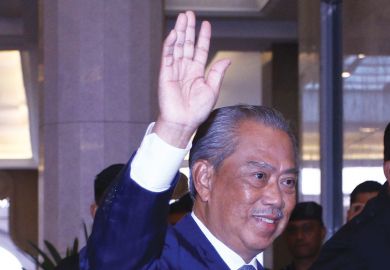Responsibility for Malaysia’s school and higher education sectors has been split for the second time in five years, after new prime minister Muhyiddin Yassin announced his cabinet.
The ministerial appointments also signal that the policy balance is swinging back towards Malay-centric approaches, as the United Malays National Organisation (Umno) – which has dominated Malaysian politics for all but the past two years – finds its way back into government.
Umno’s coalition partner in the new Perikatan Nasional government – the Malaysian United Indigenous Party (Bersatu) – precipitated the change of government when it deserted the Pakatan Harapan coalition, which had seized power from the scandal-tainted administration of Najib Razak in a surprise 2018 election result.
Mr Muhyiddin is Bersatu president and was Umno deputy president and education minister under Mr Najib. An avowed Malay nationalist, he declared in his maiden speech as leader on 2 March that he was “the prime minister for all Malaysian citizens”.
But the disclaimer is unlikely to quell fears that the country has been placed on a more Malay-first and Islamist trajectory. Meanwhile Noraini Ahmad, the new higher education minister, is a former chief of Umno’s female wing Wanita Umno and headed the party’s youth wing for five years.
Malaysia specialist James Chin said that many of the country’s leaders had roots in Umno. But he said that the new coalition would accelerate the country’s drive towards Islamisation because the Malaysian Islamic Party, which had been in opposition for more than 40 years, was now part of the ruling coalition.
“A lot of people are very worried that universities are spending too much time teaching about Islam,” said Professor Chin, director of the Asia Institute Tasmania at the University of Tasmania. “This is a long underlying problem that everyone is trying to shy away from, because politically it’s too sensitive. They refuse to deal with the underlying problem which is the issue of quality in Malaysian higher education: the lack of reforms.”
Professor Chin said that recent modifications such as an increase in scholarships for non-Malay students would be “pulled back”, while “untouchable” policies like the favourable treatment of Malays in the government’s pre-university programme would go unchallenged. “It’s too sensitive to touch,” he said.
The hiving off of higher education from the schools portfolio has been widely welcomed in Malaysia. Critics said the super ministry that was formed when Pakatan Harapan took government just 22 months ago – repeating a short-lived merger between 2013 and 2015 – was too unwieldy to manage.
But any benefits gained by the demerger risk being undermined by the inexperience of the new education minister, Radzi Jidin, who was an accounting lecturer at the University of Tasmania until just two years ago. Dr Radzi has confessed to difficulties understanding the “nitty gritty” of government, according to English language newspaper The Star, while Professor Chin said that he lacked the insider’s understanding needed to help resolve problems at the interface of school and university.
“A lot of people are concerned that he’s very new to the ministry and he’s very new to Malaysian education,” Professor Chin said.
Register to continue
Why register?
- Registration is free and only takes a moment
- Once registered, you can read 3 articles a month
- Sign up for our newsletter
Subscribe
Or subscribe for unlimited access to:
- Unlimited access to news, views, insights & reviews
- Digital editions
- Digital access to THE’s university and college rankings analysis
Already registered or a current subscriber?









